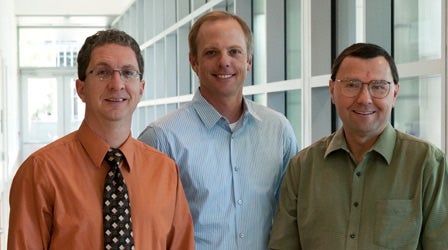Cancer Center researchers bolstered by $9.55 million grant for prostate cancer research
Colorado prostate cancer researchers, from left, Scott Lucia, Jeff Kieft and Dan Theodorescu will share a $9.55 M grant with researchers at University of Virginia.
When caught in its early stages, prostate cancer is treatable in most cases. But once it reaches a critical threshold, the disease transforms to become largely resistant to current treatments. The National Cancer Institute (NCI) recently awarded a team of cancer biologists $9.55 million over five years to define the molecular changes that occur as prostate cancer progresses to the therapy-resistant state.
The Program Project Grant (P01), “Signaling and Progression in Prostate Cancer,” brings together a multidisciplinary team of basic scientists and physician scientists at the University of Colorado Cancer Center and the University of Virginia.
“We are excited for the opportunity to bring together researchers at two top universities with the objective of discovering what drives aggressive prostate cancer and translating these findings into treatments that improve the survival in patients with advanced disease,” says Dan Theodorescu, M.D., Ph.D., director of the University of Colorado’s Cancer Center and Paul Bunn, professor of surgery and pharmacology at the CU School of Medicine, co-principal investigator on this study.
“These changes include alterations in how the cancer cells respond to signals and what genes are expressed,” says Bryce M. Paschal, Ph.D., professor of biochemistry and molecular genetics and member of the Center for Cell Signaling at the University of Virginia School of Medicine. “Understanding these changes is expected to reveal new drug targets and provide a knowledge base for improving prostate cancer therapies.”
Specifically, Theodorescu, Paschal and collaborators will explore how cell growth, adaptation to limited nutrients and cell motility contribute to the disease’s progression to its therapy-resistant form.
“We’re essentially trying to determine which pathways are altered with disease progression,” Paschal says.
To discover these altered pathways, the Program Project Grant will use a number of cutting-edge technologies, including molecular imaging, ultra-high throughput DNA sequencing, and the development of new transgenic animal models designed to mimic the changes that occur in human prostate cancer.
The three projects in the P01 program include determining how hypoxic signals alter gene expression (Theodorescu), creating new transgenic mouse models to determine how kinases cooperate to drive tumorigenesis (Paschal) and examining how micro RNAs regulate cell proliferation and prostate cancer progression (Dutta).
Members at the University of Colorado Cancer Center also include Scott Lucia, M.D., professor of pathology, and Jeffry Kieft, Ph.D., associate professor of biochemistry and molecular genetics.
University of Virginia team members also include Anindya Dutta, M.D., Ph.D., professor and chair of the Department of Biochemistry and Molecular Genetics; Henry Frierson, M.D., professor of pathology; Mark Conway, Ph.D., professor of biostatistics; David Wotton, Ph.D., associate professor of biochemistry and molecular genetics; and Dan Gioeli, Ph.D., assistant professor of microbiology, immunology, and cancer biology.


